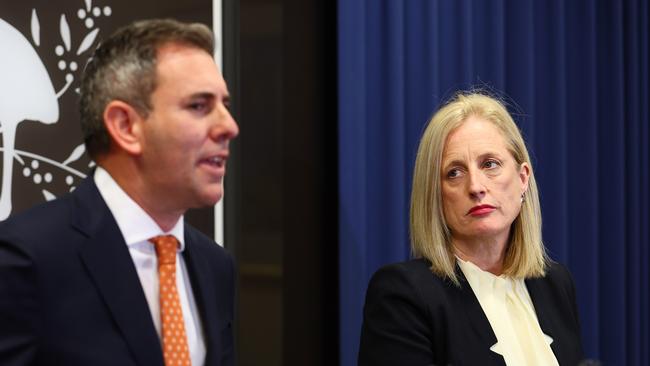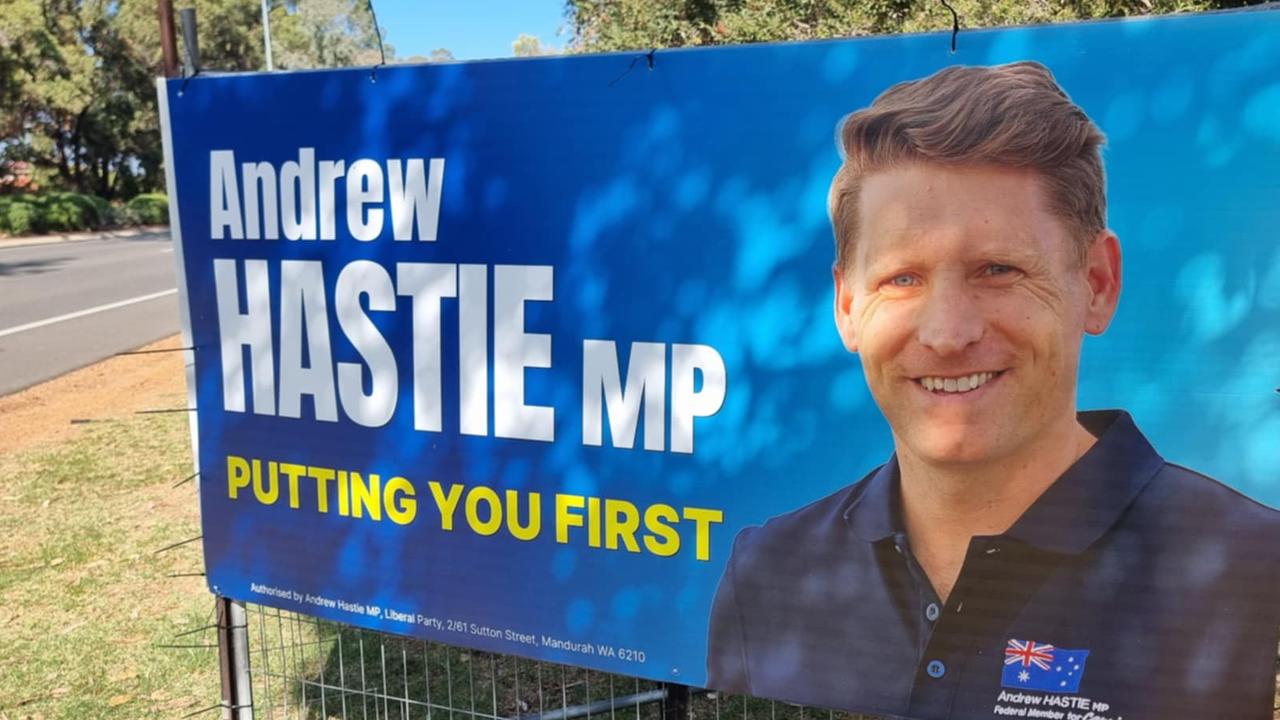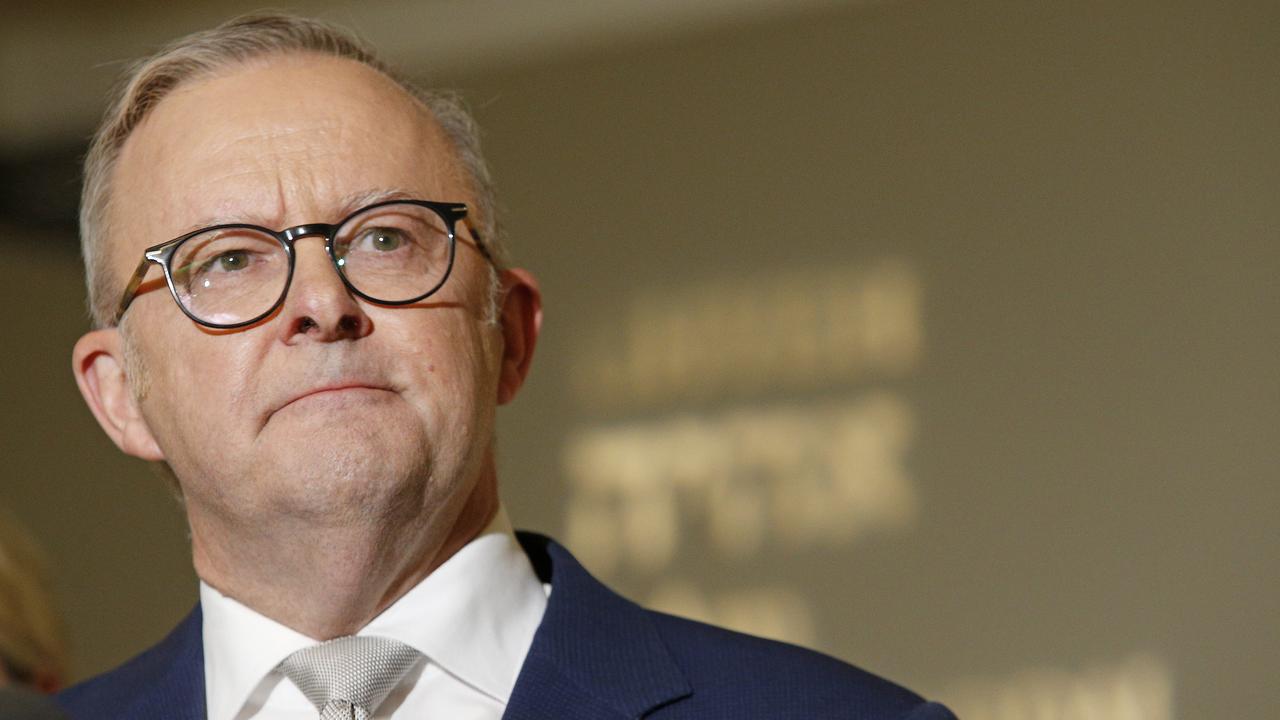Budget squeeze puts Labor surpluses in rear-view mirror
The federal budget was running a $7bn deficit across the first two months of 2024-25, as spending and tax pressures ramp p for Anthony Albanese ahead of next year’s election.

The federal budget was running a $7bn deficit across the first two-months of 2024-25 according to monthly government financial statements, fuelling speculation Anthony Albanese could skip a pre-election budget and head to the polls earlier than May.
Less than a fortnight after Jim Chalmers announced a $15.8bn surplus in 2023-24, which was $6.4bn higher than forecast in May, the budget is tracking back into the red amid weak economic growth and high rates fuelling record company insolvencies.
While monthly financial statements are considered “volatile due to timing differences between revenue and receipts, and expenses and payments”, Treasury is forecasting a long run of deficits after consecutive surpluses banked by the government.
Finance Minister Katy Gallagher on Friday said the underlying cash balance for the financial year to August 31 “was a deficit of $7bn”, which is lower than predicted in the May budget.
Total payments were $1.6bn higher than the 2024-25 budget profile and receipts were $6.9bn larger.
After bumper revenue upgrades helped the Treasurer bank $22.1bn and $15.8bn surpluses in 2022-23 and 2023-24, the May budget projected a deficit of $28.3bn in 2024-25 driven by “the government’s cost-of-living relief and addressing unavoidable spending” on health and frontline services. Treasury has forecast deficits totalling $122bn over four years, including a $42.8bn deficit in 2025-26.
Economist Chris Richardson, who believes it is unlikely the government can pull off a third surplus, said the “nation’s finances were under pressure yet they’re also better than budgeted”.
“Pressures on the budget are building but not as fast as Treasury had forecast, thanks to resilient commodity prices, resilient migration numbers and savings on interest payments,” Mr Richardson said.
“The pressure is most notable in spending, with the first two months of this financial year seeing spending 8.1 per cent up on July and August 2023. That means spending in the last 12 months just matched the peak spend during Covid.
“There’s pressure on the tax take too. Comparing the last six-months (March to August 2024), to the matching months a year ago, the company tax take is down by $10.8bn, whereas personal taxes are up by $12.8bn.”
The release of monthly financial statements comes after the Albanese government on Thursday tabled its proposed 2025 parliamentary sittings calendar, which factors-in a March 25 pre-election budget.
ALP sources have indicated if the Reserve Bank of Australia cuts rates as expected in February, there was a strong chance of a March or April election and the budget being delayed. Some Labor figures believe announcing a deficit and long-term deficits weeks before an election would be electorally unappealing and undermine the two surpluses.
Dr Chalmers and Senator Gallagher have been tasked with ensuring the Mid-Year Economic and Fiscal Outlook in December includes funding for key policies and programs in the event Mr Albanese decides to call an election before May. MYEFO will include a raft of new cost-of-living measures to help combat plunging support in opinion polls.
Opposition foreign affairs spokesman Simon Birmingham, a former finance minister, on Friday said the Coalition was working on the premise that “anything is a possibility” in relation to the Prime Minister’s preferred election timing.
“I’m not going to put my house on any of the possible election dates. What worries me about those who speculate that this means … there will definitely be a pre-election budget, is I don’t trust Anthony Albanese and Jim Chalmers not to blow the bank further in a pre-election budget,” Senator Birmingham told Sky News.
“They’ve already baked billions of dollars of extra spending into the forward estimates and beyond. If they do a budget right on the eve of an election, heaven help what that means for the finances beyond that.”




To join the conversation, please log in. Don't have an account? Register
Join the conversation, you are commenting as Logout